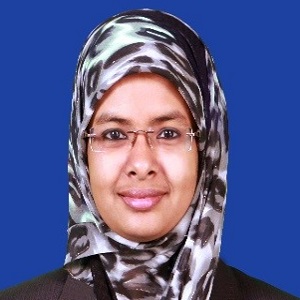
Shamima Akter Smriti
Assistant Professor
Department of Fabric Engineering
Faculty of Textile Engineering
92 Shaheed Tajuddin Ahmed Avenue Tejgaon Industrial Area, Dhaka - 1208, Bangladesh
Professional Activity
Shamima Akter Smriti, a highly dedicated, enthusiastic and resourceful teacher specializing in fabric Manufacturing has joined as Lecturer in the Department of Fabric Engineering, Bangladesh University of Textiles (BUTEX) on December 2018. She has a solid commitment to create a classroom atmosphere that is stimulating and encouraging to students and inspired them to pursue academic and personal excellence. She is also a warm and caring teacher who wants all her students to be a life-long learner. She started her early career as a Management Trainee in Fakir Apparels Group from May 2012 to September 2012. Then she served in Micro Fibre Group almost two years as a Production Engineer in Lab. In 2014, she has started her teaching career as a Lecturer in the Department of Textile Engineering, Daffodil International University and promoted to a Senior Lecturer in October 2016. During her serving, she has published a number of peer-reviewed research papers that are indexed in Scopus. She was also an active Member in Self-Assessment Committee (SAC) for IQAC of the same department, from 2016 to 2018 and arranged more than 15 workshops under SAC. She actively participated in surveying feedback of different stakeholders like alumni, employers by visiting about 20 textile factories and prepared Self-Assessment report. Her cooperation and dedication greatly helped the department to achieve VERY GOOD grade by the External peer review team. She also worked in the curriculum development committee, disciplinary committee, exam committee and class routine committee of the department. She got training on Teaching-Learning, Curriculum and Quality Assurance from GTI (Graduate Training Institute), Mymensingh, Pedagogy and Assessment on Bloom’s Taxonomy, Research Methodology, SPSS, Employability and Soft skills from IQAC, Daffodil International University.
Education
Journal Publication
Kinetics and Thermodynamics of Silk Dyeing with Turmeric Extract
Sustainable Adsorbents from Plant-Derived Agricultural Wastes for Anionic Dye Removal: A Review
An approach to improve the elasticity of rib fabric through mechanical and chemical finishing
Recent developments of the nanocellulose extraction from water hyacinth: a review
Effect of Elastane and Thread Density on Mechanical Attributes of Stretch Woven Fabric
Researchs
Field of interest:
• Artificial Intelligent specially Fuzzy Logic, Artificial Neural Network, ANFIS.
• Application of fuzzy model in textile field.
• Modelling and soft computing method used in textile field.
• Three thread fleece fabric, Polar fleece.
• Waste minimization in knitting and weaving floor.
• Fabric Comfortability.
• Composite, Geotextile, moisture transport mechanism in sportswear.
• Application of Nanotechnology in textile field.
• Renewable energy in textile industry.
• Sustainable development in knitting and weaving sector.
• Pedagogy and assessment on Bloom’s taxonomy.
Kinetics and Thermodynamics of Silk Dyeing with Turmeric Extract
Sustainable Adsorbents from Plant-Derived Agricultural Wastes for Anionic Dye Removal: A Review
An approach to improve the elasticity of rib fabric through mechanical and chemical finishing
Recent developments of the nanocellulose extraction from water hyacinth: a review
Effect of Elastane and Thread Density on Mechanical Attributes of Stretch Woven Fabric
Field of interest:
• Artificial Intelligent specially Fuzzy Logic, Artificial Neural Network, ANFIS.
• Application of fuzzy model in textile field.
• Modelling and soft computing method used in textile field.
• Three thread fleece fabric, Polar fleece.
• Waste minimization in knitting and weaving floor.
• Fabric Comfortability.
• Composite, Geotextile, moisture transport mechanism in sportswear.
• Application of Nanotechnology in textile field.
• Renewable energy in textile industry.
• Sustainable development in knitting and weaving sector.
• Pedagogy and assessment on Bloom’s taxonomy.